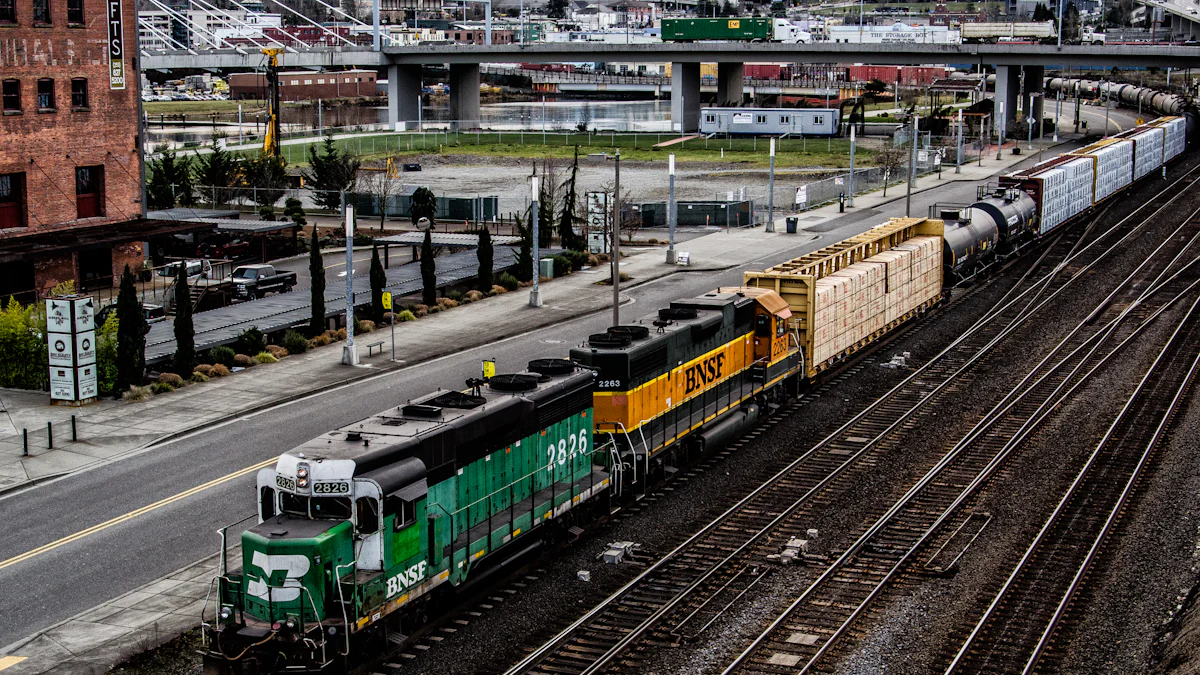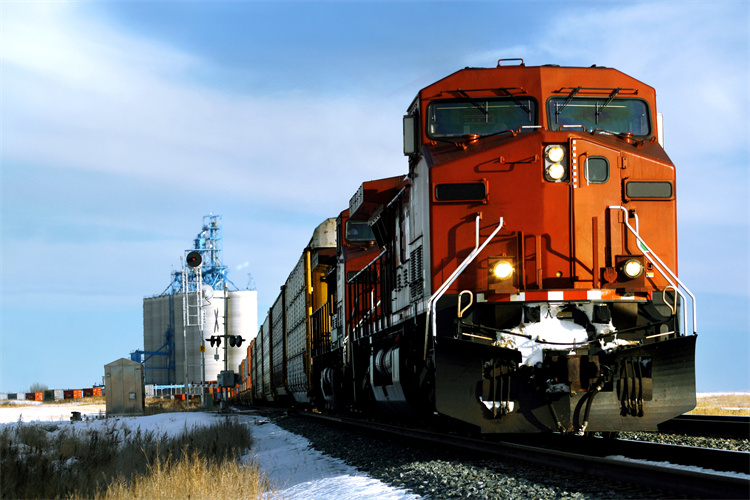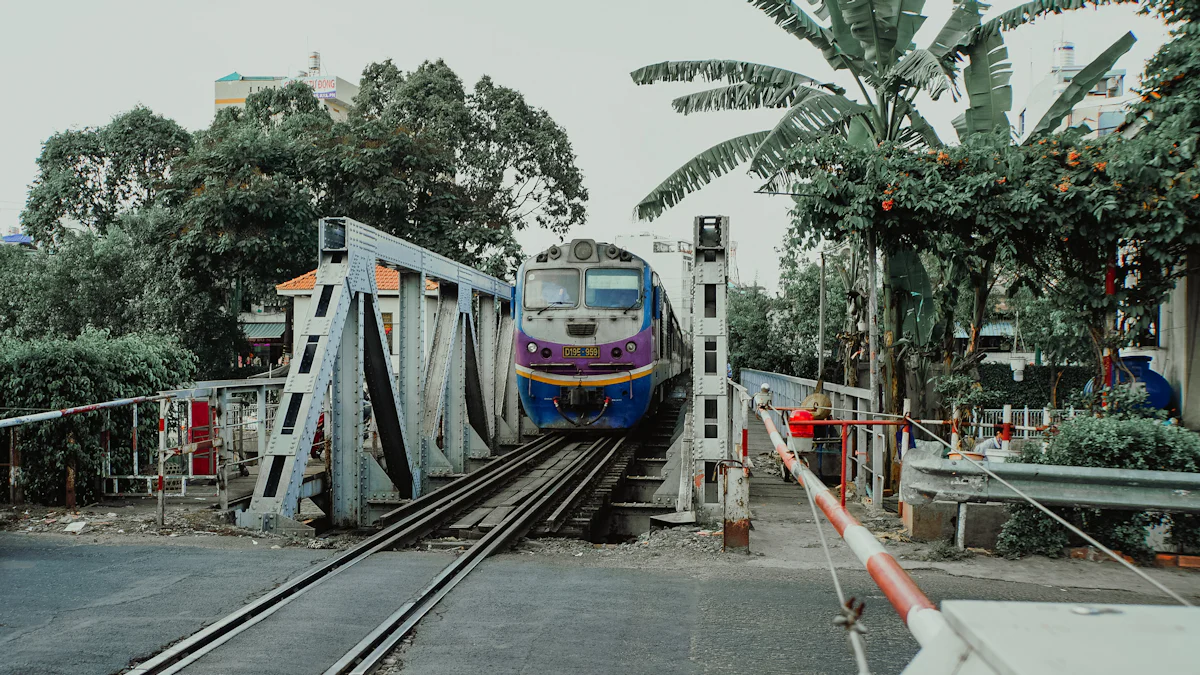Reinventing Rails: Vietnam's Leap into Logistics Leadership

Vietnam's rail logistics industry plays a crucial role in the nation's economy. The sector connects Vietnam to major international markets, including China and Europe. Rail freight volume has experienced fluctuations, reflecting dynamic market trends. The industry faces challenges such as infrastructure limitations and competition from other transport modes. However, opportunities for future development exist through strategic investments and technological advancements. JUSDA's well-established rail transport services offer comprehensive solutions, enhancing efficiency and connectivity. These developments promise significant economic benefits and growth potential for Vietnam's logistics sector.
Current Landscape of Vietnam's Rail Logistics
Infrastructure and Network
Existing rail infrastructure
Vietnam possesses a rail network that spans approximately 2,600 kilometers. The network includes several key lines that connect major cities and industrial hubs. The Hanoi-Ho Chi Minh City line serves as the backbone of this network. This line facilitates the movement of goods across the country. The infrastructure, however, requires significant upgrades to meet modern standards. Aging tracks and outdated technology hinder efficiency and safety.
Key routes and connections
The rail network features vital routes that link Vietnam to international markets. The North-South railway connects with China, enhancing trade opportunities. The Lao Cai-Hanoi-Haiphong route provides access to seaports. This connection supports export activities. JUSDA's extensive route network complements these connections. JUSDA covers over 30 countries, including China-Europe and China-ASEAN routes. Strategic partnerships ensure stable carriage capacity on these routes.
Market Dynamics
Major players in the industry
Several key players dominate Vietnam's rail logistics sector. Vietnam Railways Corporation remains the primary operator. This state-owned enterprise manages most of the rail infrastructure. Private companies also contribute to the market. JUSDA stands out with its comprehensive rail transport services. JUSDA offers full-container and less-than-container-load services. Temperature-controlled containers enhance their offerings. JUSDA specializes in international and domestic multimodal transport.
Demand and supply trends
Demand for rail logistics in Vietnam fluctuates due to various factors. Economic growth drives increased demand for efficient transport solutions. Rail offers a cost-effective alternative to road and air transport. Supply trends reveal challenges in meeting this demand. Infrastructure limitations restrict capacity. JUSDA addresses these challenges through strategic investments. Real-time monitoring and fast customs clearance improve efficiency. Energy-saving and emission reduction initiatives align with market needs.
Innovations and Technological Advancements

Digitalization in Rail Logistics
Role of technology in improving efficiency
Technology transforms rail logistics by enhancing operational efficiency. Advanced systems enable real-time tracking of shipments, providing accurate data on location and status. This transparency reduces delays and improves customer satisfaction. Automated scheduling systems optimize train routes, minimizing fuel consumption and operational costs. High-speed trains offer a reliable mode for transporting goods, ensuring timely deliveries. This reliability boosts supply chain efficiency and competitiveness in the global market.
Examples of digital solutions
Digital solutions revolutionize rail logistics with innovative applications. JUSDA employs real-time monitoring to track temperature, humidity, and air pressure during transit. This capability ensures the safe transport of sensitive goods. Fast customs clearance systems expedite cargo transfers, reducing waiting times at borders. Strategic partnerships guarantee stable cabin availability, enhancing service reliability. These solutions demonstrate the potential of technology to transform rail logistics.
Sustainable Practices
Environmental impact of rail logistics
Rail logistics presents a more sustainable option compared to road and air transport. Trains consume less energy per ton-mile, reducing carbon emissions. High-speed rail systems further enhance environmental benefits through lower maintenance costs and energy consumption. These systems improve service reliability while lowering operational costs. The environmental impact of rail logistics aligns with global efforts to reduce carbon footprints.
Initiatives for sustainability
Sustainability initiatives focus on reducing the environmental impact of rail logistics. JUSDA emphasizes green transportation through energy-saving and emission reduction strategies. The development of high-speed railways in Vietnam aims to lower logistics costs and product prices. This approach enhances the competitiveness of goods in international markets. Elevated rail systems offer another sustainable solution, reducing travel distances and land acquisition needs. These initiatives highlight the commitment to sustainable practices in rail logistics.
Strategic Considerations for the Future
Investment and Development Plans
Government policies and initiatives
Vietnam's government has recognized the strategic importance of rail logistics in enhancing economic growth. The Ministry of Transport has launched a comprehensive action plan to modernize the rail infrastructure by 2030, with a vision extending to 2045. This plan includes the construction of a high-speed North-South express rail line. This project aims to significantly boost logistics efficiency and reduce costs. Supportive regulatory frameworks will play a crucial role in the successful implementation of these initiatives. The government encourages foreign investments, particularly from China, to support rail infrastructure projects. These efforts align with global trends toward sustainable development and energy efficiency.
Private sector involvement
The private sector's involvement is essential for the advancement of Vietnam's rail logistics. Companies like JUSDA have already made significant contributions to the industry. JUSDA's investment in technology and infrastructure enhances the overall efficiency of rail transport. The company provides full-container and less-than-container-load services via China-Europe block trains. Temperature-controlled containers ensure the safe transport of sensitive goods. JUSDA's strategic partnerships with key train platforms guarantee stable carriage capacity. These collaborations highlight the potential for public-private partnerships to drive innovation and growth in the sector.
JUSDA's Role in Rail Logistics
Overview of JUSDA's services
JUSDA offers a comprehensive range of rail transport services tailored to meet diverse market needs. The company's extensive route network covers over 30 countries across the Eurasian continent. This network includes routes like China-Europe, China-Russia, China-Central Asia, and China-ASEAN. JUSDA specializes in international Eurasian sea-rail intermodal transport and domestic multimodal transport by road, water, and rail. Real-time monitoring and fast customs clearance enhance operational efficiency. JUSDA's commitment to energy-saving and emission reduction aligns with global sustainability goals.

SMART JUSDA
Supply Chain Management Solution
Impact on the logistics industry
JUSDA's innovative approach to rail logistics has a profound impact on the industry. The company's advanced monitoring capabilities ensure the safe and efficient transport of goods. JUSDA's strategic partnerships with government entities and train platforms provide a stable cabin guarantee. This reliability enhances service quality and customer satisfaction. JUSDA's focus on green transportation contributes to reducing the environmental impact of logistics operations. The company's efforts demonstrate the potential for rail logistics to play a pivotal role in Vietnam's economic development.
Future Development in Vietnam's Rail Logistics

Future Development Prospects
High-speed rail projects
Vietnam plans to revolutionize its rail logistics with high-speed rail projects. The government aims to construct a high-speed North-South express rail line by 2030. This ambitious project will significantly enhance the efficiency of logistics operations. High-speed trains will reduce transit times, offering a competitive edge over other transport modes. Vietnam's rail infrastructure requires substantial upgrades to accommodate these advancements. The introduction of high-speed rail will mark a new era for Vietnam's rail logistics.
Economic impact and growth potential
The economic impact of high-speed rail projects will be profound. These projects will lower logistics costs, making Vietnamese goods more competitive in international markets. The reduction in transit times will facilitate faster delivery of goods, boosting trade activities. Vietnam's GDP is expected to grow by one percentage point annually due to these developments. The rail freight sector holds immense potential despite recent declines. High-speed rail will rejuvenate this sector, driving economic growth and development.
Future Development Strategies
Enhancing connectivity and efficiency
Enhancing connectivity and efficiency remains a priority for Vietnam's rail logistics. Upgrading existing rail infrastructure will improve the movement of goods across the country. Efficient customs procedures will expedite cargo transfers, reducing delays at borders. JUSDA's real-time monitoring capabilities will ensure the safe transport of sensitive goods. The company's extensive route network will enhance connectivity, covering over 30 countries. Strategic partnerships will guarantee stable carriage capacity, improving service reliability.
Role of international partnerships
International partnerships will play a crucial role in Vietnam's rail logistics evolution. The government encourages foreign investments to support rail infrastructure projects. Collaborations with countries like China will provide the necessary expertise and resources. JUSDA's strategic partnerships with key train platforms will ensure stable cabin availability. These partnerships will drive innovation and growth in the sector. Vietnam's logistics industry will benefit from the exchange of knowledge and technology.
Vietnam's rail logistics sector stands at a pivotal juncture. The industry has witnessed significant advancements in infrastructure, technology, and strategic partnerships. JUSDA's comprehensive services enhance operational efficiency and connectivity. The future outlook remains positive with high-speed rail projects and e-commerce growth driving demand for modern logistics solutions. Stakeholders must seize these opportunities by investing in sustainable practices and fostering international collaborations. Vietnam's logistics market is poised for robust growth, promising substantial economic benefits.
See Also
Innovative Technology in Logistics: Exploring Tomorrow's Possibilities
Artificial Intelligence in Supply Chain: Transforming Future Logistics
Unlocking Opportunities: Demystifying AI in Logistics
Prepared for Change? Delving into Cutting-Edge Transport Tech for Supply Chains
Transforming the Logistics Landscape: The Influence of Supply Chain Advancements
